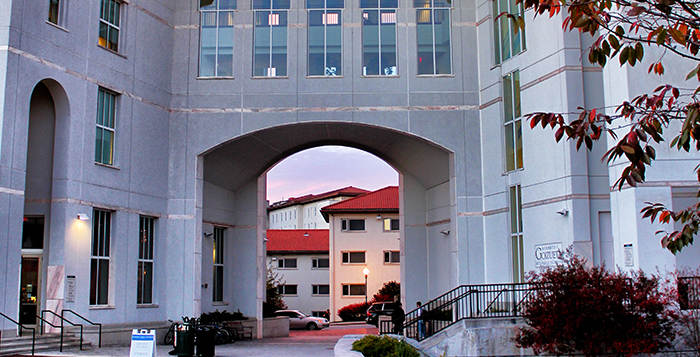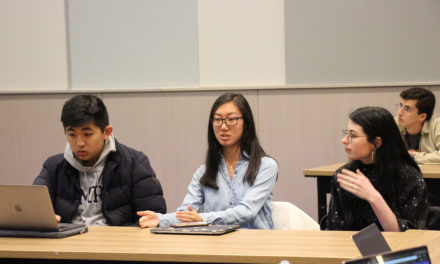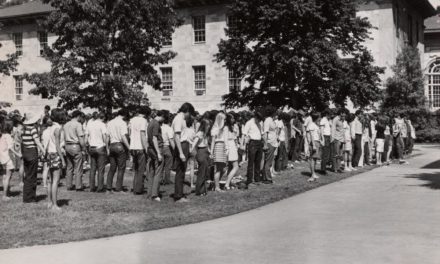By Wendy Becker
Staff Writer
A reading of Irish writer Samuel Beckett’s personal correspondence celebrated the publication of the third volume of “The Letters of Samuel Beckett” on Wednesday night at the Schwartz Center for Performing Arts.
Titled “Whatever is to Come” and hosted by The Letters of Samuel Beckett Project, the reading featured various aspects of the newly published “The Letters of Samuel Beckett: 1957-1965.” Approximately 150 students, faculty, alumni and visitors filled the red velvet seats of the Emerson Concert Hall to view the hour-long reading featuring Irish actor Barry McGovern and Atlanta actors Carolyn Cook, Brenda Bynum and Robert Shaw-Smith.
The Laney Graduate School, Donna and Marvin Schwartz Artist-in-Residence Program, Theater Emory and the Department of Theater Studies, the Consulate General of Ireland in Atlanta, the Consulate General of France in Atlanta and the British Consulate General in Atlanta co-sponsored the event.
Beckett is widely regarded as an influential 20th century avant-garde novelist, playwright, theater director and poet. Beckett worked in both French and English and won a Nobel Prize in 1969.
According to the Laney Graduate School’s website, The Letters of Samuel Beckett Project became affiliated with Laney one year after Beckett passed away in 1990. The project itself originated in 1985 when Beckett authorized Martha Dow Fehsenfeld and Lois More Overbeck to start going through over 15,000 of his letters. According to the website, this process entails transcription of the letters, data record keeping, basic research, as well as work in archives here and abroad. The project offers students the chance to get involved in research through work-study job opportunities.
After starting its affiliation with Emory, the project received four grants from the National Endowment for the Humanities, along with support from the Florence Gould Foundation.
Ireland’s Minister for Arts, Heritage and the Gaeltacht, Heather Humphreys, read an introduction for the event.
“This current edition that spans 1957-1965 is a wonderful collection that greatly adds to our understanding of this complex man,” Humphreys said. “This publication reveals the character of the writer as a man. He is at times unyielding, at other times generous and self-deprecating, but always fascinating.”
The reading began with a sound clip of Franz Schubert’s Death and the Maiden and a single spotlight on the stage. The four readers dressed in all black sat around a large poster of Beckett, which sat center stage. The audience sat transfixed, and the silence was only broken with the occasional fragments of sporadic laughter.
Beckett’s letters included descriptions of his struggles with work, gave insights to his personal and work-related relationships and include lengthy descriptions of his views of the world. The reading included letters to and from his wife Suzanne, his friend Barbara Bray and various other authors and playwrights.
The first volume of Beckett’s letters from 1929-1940 was published in 2009, and the second volume of letters from 1945-1956 was published in 2011. The project is currently working on the fourth and final volume.
Lisa Tedesco, vice provost of academic affairs and dean of the Laney Graduate School, welcomed the audience and gave a brief description of the program and its importance to Laney.
“The Beckett Project has been a real joy to the Laney School,” Tedesco said. “It is a real treasure.”
According to speeches made at the introduction for the event, the Letters project received favorable reviews by many, including members of the Irish press.
Humphreys said that this was a testament to the work done by Overbeck and the numerous others that contributed.
“Their work was described by the Irish media as a work of meticulous scholarship,” Humphreys said. “I endorse that view.”
Sarah Harsh, a second year English Ph.D. graduate school student, said the event was a great way to showcase what she studies and that her recent involvement in the research project has been tremendously interesting.
“I thought it was a beautiful event,” Harsh said. “It was amazing to see the letters come alive and to be able to be a part of the larger Irish community. They really breathed life into the letters.”
College freshman Nilang Shah, who works for The Letters of Samuel Beckett Project, stated that the event allowed him to see a different side of Beckett’s letters than what he would obtain just by reading them.
“In his writing, you get this tragic look at life,” Shah said. “By seeing them read, you can really hear the humor and lighthearted aspects. The accents were my favorite part.”
Those who worked on the event said they were pleased that the event met their expectations.
College senior Narianna Kretschmer also works on The Letter of Samuel Beckett Project and helped with research for the third volume. She said she really enjoyed the reading.
“We’ve been working on this for a very long time,” she said. “A ton of research goes into it and this is the culmination and celebration of that.”
While both Kretschmer and Shah said they were happy with the general turnout, they both said they had hoped more Emory students would attend the event.
“I don’t think that it was advertised enough,” Kretschmer said. “Students wouldn’t know about this. Word did spread really well to alumni, grad students and people who contributed to the project.”
College senior Elena Chapman said her passion for Beckett and an Irish poetry class led to her attendance.
“I read one of Beckett’s novels, ‘Molloy,’ for a different class,” Chapman said. “It was one of my favorite books. Beckett’s style of writing is really unique. When you finish one of his books you feel really accomplished, so that’s nice.”
Some attendees discussed Beckett’s representation of Irish literature more generally. Paul Gleeson, the consul general of Ireland in Atlanta, stated that Beckett is an example of the amazing literature Ireland has produced.
“Ireland has been described as the smallest cultural superpower,” Glesson said. “I loved that. Here tonight we are celebrating one of Ireland’s real superpowers.”
Harsh also stated that Beckett and the project give her an opportunity to connect with her passion of Irish literature, in which she has a Master of Arts degree from New York University.
“I’ve always loved Beckett, but I never had the chance to focus on him,” Harsh said. “This project really provides me with a great opportunity to immerse myself in his world.”
The reading ended with a bow from the actors and a round of applause for Beckett himself.
College senior Hyein Kim said the event was a completely new experience.
“This is my first event like this,” she said. “I think this gave me a glimpse of the real world of art.”
– By Wendy Becker, Staff Writer
The Emory Wheel was founded in 1919 and is currently the only independent, student-run newspaper of Emory University. The Wheel publishes weekly on Wednesdays during the academic year, except during University holidays and scheduled publication intermissions.
The Wheel is financially and editorially independent from the University. All of its content is generated by the Wheel’s more than 100 student staff members and contributing writers, and its printing costs are covered by profits from self-generated advertising sales.






